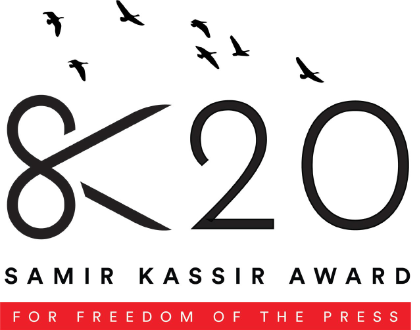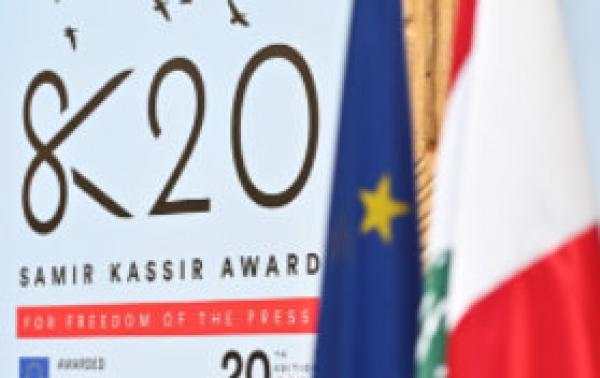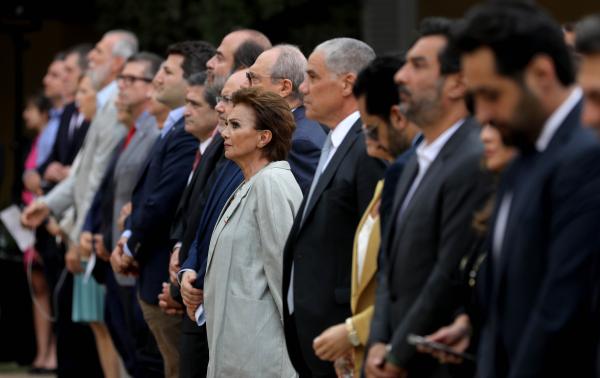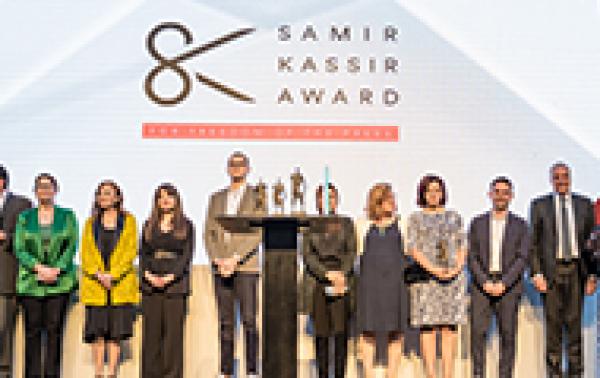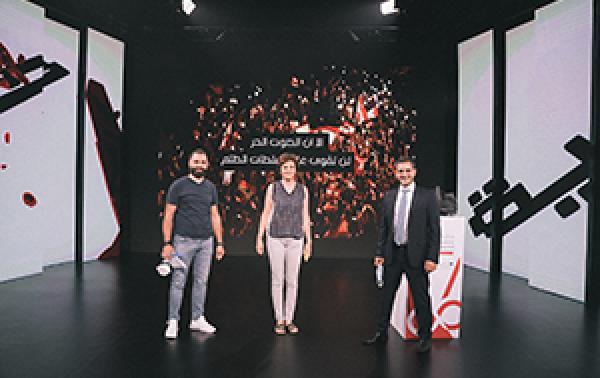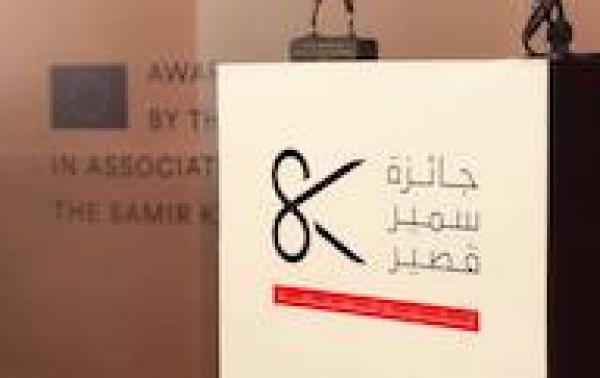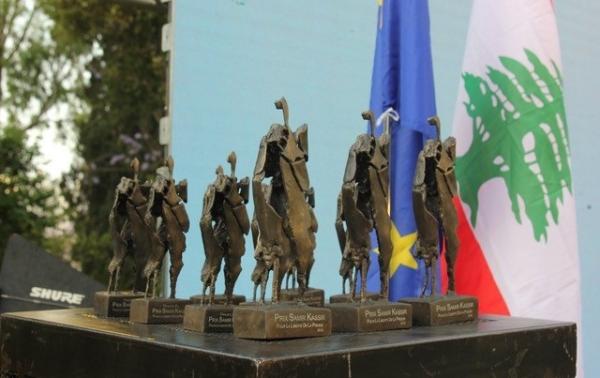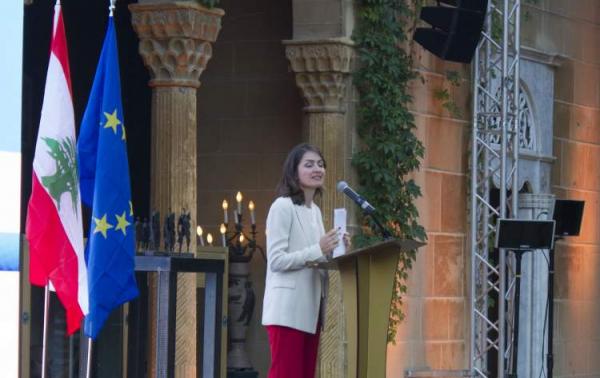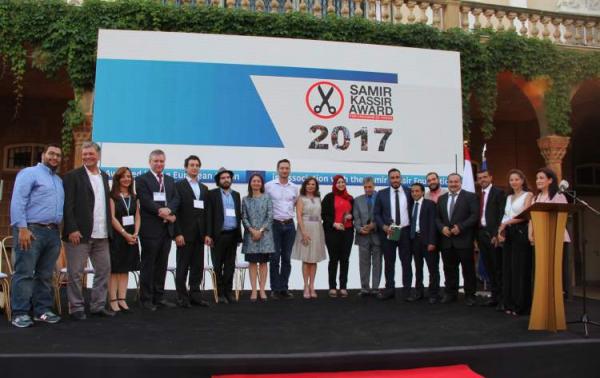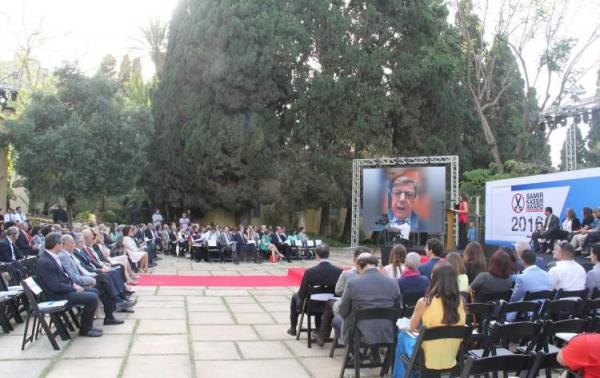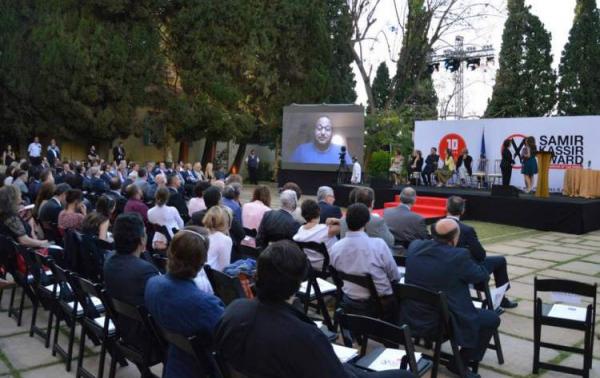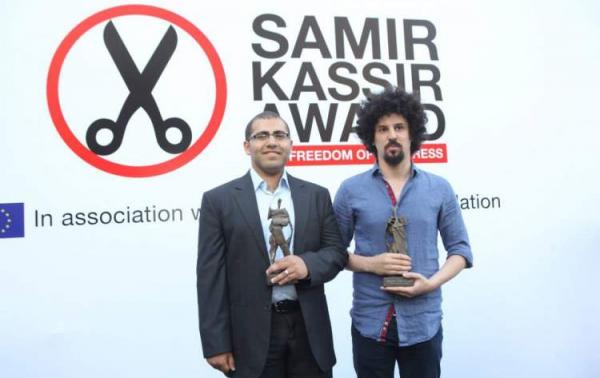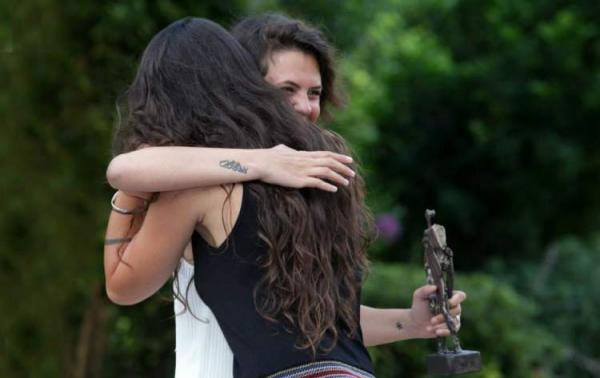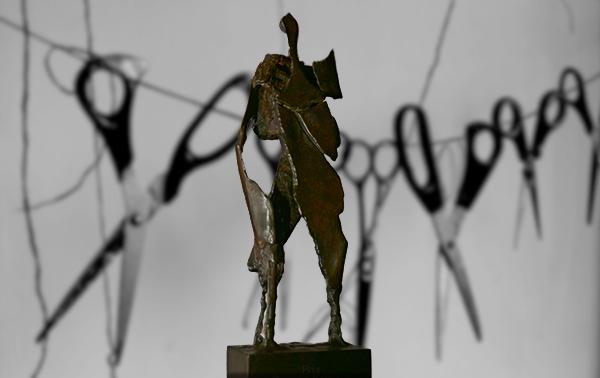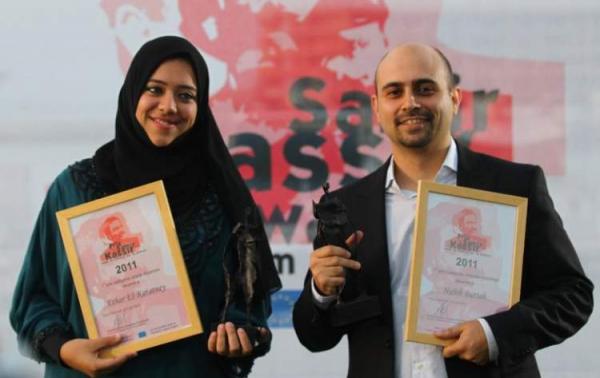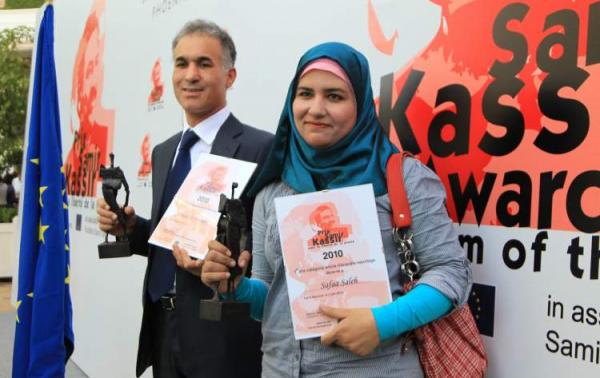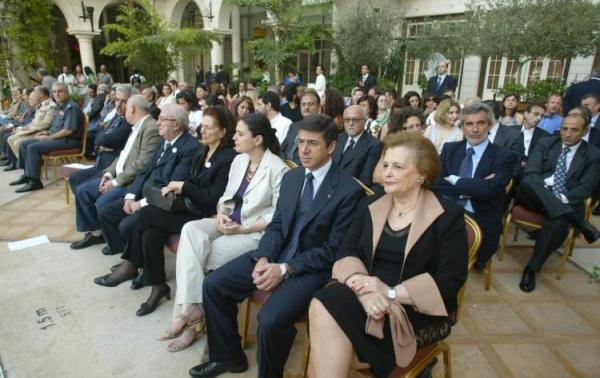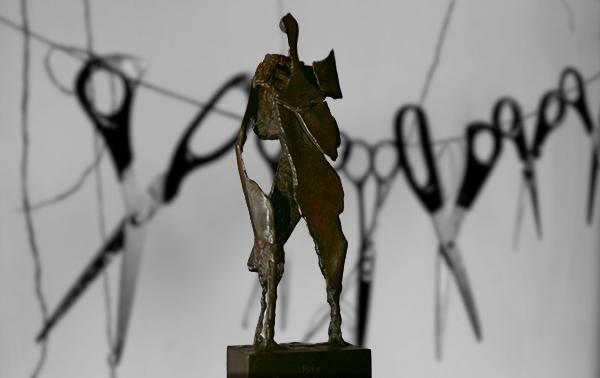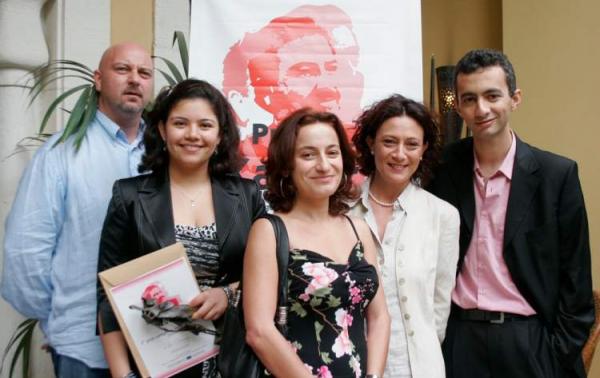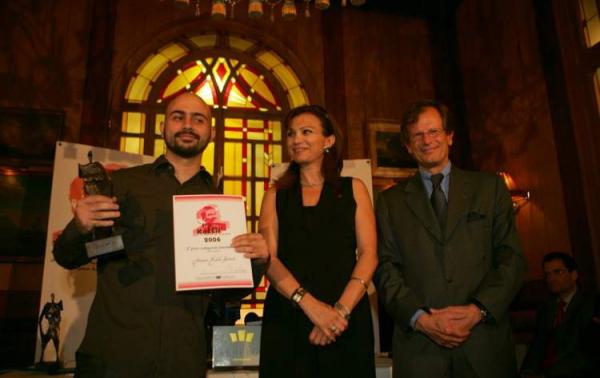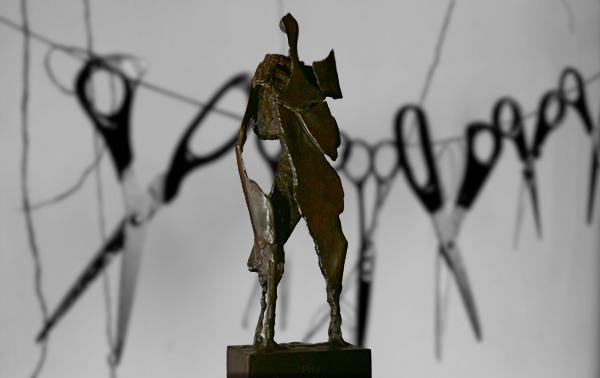Home
The European Union rewards journalists from Palestine, Egypt and Syria during the 2025 edition of the Samir Kassir Award
On 3 June 2025, the Delegation of the European Union to Lebanon and the Samir Kassir Foundation announced the results of the 20th edition of the Samir Kassir Award for Freedom of the Press, in a ceremony held at the Sursock Palace Gardens, in Beirut. This Award, established and funded by the European Union, is recognised internationally as a flagship prize for press freedom and the most prestigious journalism award in the Middle East, North Africa and Gulf region. Since 2006, the Award ceremony has been held annually to commemorate the anniversary of Lebanese journalist Samir Kassir’s assassination on 2 June 2005 in Beirut, and celebrate his life, his values, and his memory.
The Samir Kassir Award is open to professional journalists from eighteen countries of North Africa, the Middle East, and the Gulf. This year, a record 372 journalists participated in the competition, hailing from Algeria, Bahrain, Egypt, Iraq, Jordan, Lebanon, Libya, Morocco, Palestine, Syria, Tunisia, and Yemen. 125 candidates competed in the Opinion Piece category, 157 in the Investigative Article category, and 90 in the Audiovisual News Report category. The winner in each of the three categories is awarded a prize of €10,000. Each of the short-listed finalists per category receive a €1,000 prize.
The winners of the 2025 Samir Kassir Award are:
- Opinion Piece Category: Badar Salem, from Palestine, born in 1980, for her article titled “On the Normalisation of Sumud in Gaza,” published in Romman Magazine on 19 July 2024. In her piece, Badar critiques the glorification of sumud (steadfastness) in Gaza, arguing that idealizing resilience imposes unrealistic expectations on Palestinians and masks the profound trauma they endure. It calls for shifting from celebrating endurance to recognizing the right to vulnerability, care, and dignity in the face of ongoing violence.
- Investigative Reporting Category: Marina Milad, from Egypt, born in 1994, for her investigation titled “’I Have Become Shameful’: Syrian Women Leave Prison with a "Stigma"’, published in Masrawy on 25 February 2025. This report reveals that after enduring torture, rape, and dehumanization behind bars, many Syrian women emerge into a society that greets them with stigma, rejection, and renewed trauma, instead of empathy and genuine support.
- Audiovisual News Reporting Category: Khalil Alashavi, from Syria, born in 1983, for his report titled “Syria: Children in a Never-Ending War”, produced by Tiny Hands and launched on 15 March 2025. The report focuses on the continued plight of Syrian children in their war-torn country, and the years of stolen innocence, which a regime change alone cannot address.
Speaking at the ceremony, the Ambassador of the European Union to Lebanon, Sandra De Waele, said: “50 courageous journalists have received the Samir Kassir Award since 2006. Journalists who, despite the risks, have used their voice to hold the powerful accountable, to expose corruption, and to give a voice to the voiceless. Yet they persist, because, like Samir, they believe that the truth matters and the public has the right to know. And this is what the Samir Kassir Award stands for. More than a recognition of excellence, it has become a platform that brings powerful stories from the Middle East, North Africa, and the Gulf to the world, that sparks difficult but necessary conversations, and that creates a space where journalists can support one another in their mission.”
Malek Mrowa, Acting President of the Samir Kassir Foundation, said: “Over the past two decades our region has endured uprisings, revolutions, counter-revolutions, wars, and exoduses. The targets of oppression keep shifting: one year it is protesters in the street, the next it is women demanding bodily autonomy, the next it is reporters who dare to film a checkpoint. But the core struggle has never changed: the right to think freely, to speak openly, and for citizens to know what is done in their name. That struggle is embodied in every entry we receive for the Samir Kassir Award.”
An independent seven-member jury from the Arab League and European Union member states selected the winners. This year’s jury gathered Ali Amar (Morocco), editor-in-chief of Le Desk, Antoine Haddad (Lebanon), vice-president of the Saint George University of Beirut and the Samir Kassir Foundation’s representative in the jury, Mina Al-Oraibi (Iraq), editor-in-chief at The National, Jean-Pierre Perrin (France), political writer, Paul Radu (Romania), co-founder of the Organized Crime and Corruption Reporting Project (OCCRP), Natalia Sancha (Spain), journalist, photographer, and communication expert, and Lina Sinjab (Syria), Middle East Correspondent at BBC.
The ceremony was broadcast live on the Lebanese Broadcasting Corporation International (LBCI) and was viewed by thousands of people across the region on LBCI’s local network, satellite channel worldwide and online on the Award’s social media accounts.
login
Warning: include(pages/login.php): Failed to open stream: No such file or directory in /home/samirkas/samirkassiraward.org/partials/content.php on line 57
Warning: include(): Failed opening 'pages/login.php' for inclusion (include_path='.:/opt/alt/php84/usr/share/pear:/opt/alt/php84/usr/share/php:/usr/share/pear:/usr/share/php') in /home/samirkas/samirkassiraward.org/partials/content.php on line 57
Samir Kassir
His professional and intellectual life
Samir Kassir was born on May 4, 1960, to a Lebanese-Palestinian father and a Lebanese-Syrian mother. He grew up in the Ashrafieh neighborhood of Beirut and studied at the Lycée Français. In 1981, six years after the beginning of the Lebanese war, he moved to Paris to pursue his higher studies. In 1984, he received his Master's degree in political philosophy from the Sorbonne (Université Paris I) and 1990, his PhD in contemporary history from Université Paris IV.
During the years he spent in Paris, he published a number of articles in the Al-Hayat and L'Orient-Le Jour newspapers. He also wrote for Le Monde Diplomatique and had regular contributions to The Seventh Day and the French edition of the Journal of Palestinian Studies.
In 1992, in collaboration with his friend, the Syrian historian and publisher Farouk Mardam Bey, he published "Itineraries from Paris to Jerusalem", a French book in two volumes, describing the French policy in the Arab Levant, especially in regards to the Palestinian Nakba and the Arab-Israeli conflict. A year after, he returned to Beirut to teach at Université Saint-Joseph's political science institute and join the An-Nahar newspaper as an op-ed writer and the director of the paper's publishing house.
In 1994, Samir published his second book in French "The Lebanon War", based on his doctoral thesis, and analyzing the dynamics of the conflict as well as the intricate relations of internal and foreign factors during the 1975-1982 period. This book was translated to Arabic in 2008.
In 1995, Samir starts a monthly magazine "L'Orient-Express", which rapidly became the most prestigious cultural periodical in Lebanon. The publication was interrupted in 1998 for financial reasons. In parallel, he founded "Al-Layali", a publication house that released several books of articles initially published in "L'Orient-Express", as well as catalogues of old colonial advertisements for Mediterranean cities and Egyptian movies from the 1960s and 1970s.
Samir Kassir's articles and op-eds in An-Nahar in the late 1990s and early 2000s are still viewed as the boldest writings against the Syrian hegemony in Lebanon, the rule of former President Emile Lahoud, and the political role of security apparatuses. These articles pushed General Jamil Sayed, the former director general of the General Security, to threaten Kassir, get him chased, and confiscate his passport at the Beirut International Airport in April 2001, before returning it to him after the subsequent political and cultural outcry.
In 2003, Samir published his third book in French "History of Beirut" (translated to Arabic in 2007 and to English – titled "Beirut" – in 2011). The book describes the capital's history, families, culture, economy, as well as its urban and social development, and its relations with other Lebanese regions, Arab and Mediterranean cities. After his book, a cornerstone of his intellectual life, Samir published in 2004 two books in Arabic: "Democracy in Syria and Lebanon's Independence" and "Askar Ala Meen", comprised of a series of Articles he had published in An-Nahar. The first book focused on the link between the democratic transition in Syria and Lebanon's independence, while the second highlighted the contradiction between the principles of liberty and republican values on the one hand, and the political role of security apparatuses on the other.
Samir published another book in French "Considérations sur le malheur arabe" (English title: "Being Arab"), which was later translated to a dozen languages. The book analyses the reasons for the aborted Arab renaissance in the late 19th century, refutes the simplistic assessments condemning Arabs to an eternal decline, and points out to the geographical, rather than historical, reasons for Arab populations' current misfortune.
His political journey
After the assassination of former Prime Minister Rafik Hariri on February 14, 2005, Samir Kassir actively participated in the launch of the wide popular uprising against the Syrian security apparatuses' stranglehold on Lebanon. He gave the uprising its title "The Independence Intifada", to highlight its patriotic, pro-independence nature, and echo the 1987 Palestinian Intifada against the Israeli occupation. His articles in An-Nahar became the Independence Intifada's clearest and loudest voice. He was constantly present on Martyrs' Square, discussing ideas and proposals to succeed in the recovery of the country's sovereignty and freedom, with politicians, journalists, and students.
Samir Kassir was undoubtedly the first to warn that the Independence Intifada will not be able to sustain its momentum, in the absence of a political platform calling for political and economic reform, laying the foundation of a non-sectarian system, and allowing for a genuine political reconciliation, after the Syrian army's withdrawal from Lebanon. He also was the first to call for an "Intifada within the Intifada" to keep the popular momentum alive, restore the nobility of politics and clarity of stances. In parallel, Samir Kassir opposed all forms of Lebanese racism toward the Syrian people in general, and constantly called upon the Lebanese people in his articles and in his speeches on Martyrs' Square, no to mix up the Syrian regime and its intelligence service controlling Lebanon and Syria, on the one hand, with the Syrian people, workers, and intellectuals, on the other.
The Samir Kassir Foundation
Samir Kassir was assassinated on June 2, 2005, in Beirut, when a bomb placed under his car was detonated. The tragic death of this journalist and writer was one of many attempts to silence Lebanese free thinkers, put an end to the Independence Intifada, and prevent Beirut's winds of liberty from spreading across the region. Samir Kassir, who wrote Beirut's history, has therefore become a part of this history.
The model of intellectual renaissance embodied by Samir Kassir during his life and at the moment of his death, through his articles and academic research, has placed him at the avant-garde of Lebanese and Arab opinion leaders who have paid their life to fight tyranny and lead their country to freedom and independence.
Committed to Samir Kassir's values and aspirations, and believing in the need to renew the Arab culture through freedom of expression, several intellectuals and friends of Samir Kassir established the Samir Kassir Foundation, officially incorporated in Beirut under registry number 30/A.D., dated February 1, 2006.
The Samir Kassir Foundation is a non-profit civic organization, working within the civil society and cultural circles to spread the democratic culture in Lebanon and the Arab world, encourage the new talents of free press, and build the movement for a cultural, democratic, and secular renewal. These are the conditions to lift the Arab populations out of their state of despair.
The Samir Kassir Foundation's mission is built around three pillars:
- The first pillar: preserving, translating, and spreading Samir Kassir's literary, academic, and journalistic heritage.
- The second pillar: promoting cultural freedom and free thought, through conferences, specialized seminars, and an annual art festival providing all social categories with access to international cultural expression.
- The third pillar: defending press freedom, through monitoring and documenting violations perpetrated against journalists and media professionals, and awarding prizes to young journalists.
The Foundation's actions are not limited to the three aforementioned pillars. The Foundation is involved in all what honors Samir Kassir's memory, and contributes to the fulfillment of his thrive for freedom and renaissance. These were the two aspirations to which Samir Kassir dedicated his life.
History
The history of the Samir Kassir Award for Freedom of the Press dates back to 2005 when the European Commission first announced on 7 October 2005, the establishment of this European Union Award during a press conference held in Beirut.
“It is time to realise and to admit that freedom of expression is neither just a detail in countries’ cooperation with Europe nor an option for dialogue. It is an inalienable right, a non-negotiable principle.” With these words, the then-Head of the European Commission Union to Lebanon, Ambassador Patrick Renauld, highlighted the raison d’être of this prize. The Samir Kassir Award was established by the European Union to reward journalists from countries in North Africa, the Middle East and the Gulf invested in covering issues related to human rights, good governance, rule of law, the fight against corruption, freedom of expression, democratic development, and citizen participation.
This European Union initiative from the very beginning was embraced and supported by friends of Samir Kassir who, on 1 February 2006, launched the Samir Kassir Foundation. The award aims to “legitimise freedom of thought and encourage freedom of the press in countries that have committed to the Euro-Mediterranean Partnership, in order to assert their rejection of violence, intimidation, threats and recurring and consistent attempts to curtain freedom of expression.”
The first Award ceremony was held on 2 June 2006, on the first anniversary of Samir Kassir’s assassination. During that first edition, two journalists received the prize. In 2007 and 2008, the Samir Kassir Award was divided into two categories: best article and best master’s thesis. Over the years, the award evolved and from 2009 to 2012, it focused exclusively on print journalism, particularly best opinion article and best investigative article. In 2013, a third category was added: best audiovisual news report. In 2020, due to the COVID-19 pandemic, the announcement of the results was postponed till September 10 during a special televised prime-time show. The 2020 edition also included a special Students' Award, granted by students from Lebanese universities, and since 2021 by students from universities across the MENA region.
Since the first award ceremony was held in 2006, the Award has been conferred 20 times, recognizing the work of 57 journalists and researchers, comprised of 34 men and 23 women. The winners have included journalists who are living in exile and others who undertake their work at great personal cost, facing risks of persecution and threats to their freedom of expression and their life.
Two journalists won the prize twice: Lebanese journalist Habib Battah in 2006 and 2011 and Iraqi journalist Asaad Al-Zalzali in 2017 and 2018. The Award went 19 times to Egyptian winners, 13 times to Syrian winners, 9 times to Lebanese winners, 5 times to Palestinian winners, 3 times to Tunisian winners, 3 times to Iraqi, 2 times to Moroccan winners, and once to Libyan, Jordanian, Algerian, and Yemeni winners.
Every year the Award jury is composed by seven different people of different nationalities and backgrounds. Four members of the jury originate from the Arab world and three from European Union Member States. Members of the jury among others have included journalists, media professionals, human rights investigators and experts, researchers, civil society and former government representatives recognized for their contribution to advancing human rights causes.
The Award has since become the most prestigious journalism award in the Middle East, North Africa and Gulf region and is recognized globally as one of the top journalism awards.
Members of the Jury:
2006: Hassan Balawi (Palestine), Richard Bteich (Germany), Ariane Bonzon (France), Walid Choucair (Lebanon), Perilhou Henri (France), Elias Khoury (Lebanon), Henri Mamarbachi (Lebanon), Fouad Naïm (Lebanon), and Massimo Tommasoli (Italy).
2007: Tomas Alcoverro (Spain), Mohammed Ali Atassi (Syria), Ziyad Baroud (Lebanon), François Bonnemain (France), Pierre El Daher (Lebanon), Walid Kassir (Lebanon), Jim Muir (United Kingdom), Hassan Tlili (Tunisia), and Layla Al Zubaidi (Germany).
2008: Jean-Paul Chagnollaud (France), Ghassan El Ezzi (Lebanon), Carole Habib Kassir (Lebanon), Alistair Lyon (United Kingdom), Delphine Minoui (France), Hazem Saghieh (Lebanon), and Hani Shukrallah (Egypt).
2009: Jad Al Akhaoui (Lebanon), Nora Boustany (Lebanon), Sari Hanafi (Palestine), Roula Khalaf (Lebanon), Franck Mermier (France), Monica Prieto (Spain), and Lamia Radi (Egypt).
2010: Ahmed Reda Benchemsi (Morocco), Amine Kammourieh (Lebanon), Birgit Kaspar (Germany), Jamal Khashoggi (Saudi Arabia), Nahida Nakad (France), and Maya Yahya (Lebanon).
2011: Samir Aita (Syria), Rula Amin (Palestine), Neji Bghouri (Tunisia), Mona Eltahawy (Egypt), Dominic Evans (United Kingdom), Maroun Labaki (Belgium), and Najib Khairallah (Lebanon).
2012: Lamis Andoni (Palestine), Lasaad Ben Ahmed (Tunisia), Gabriel Deek (Lebanon), Anne-Marie El Hage (Lebanon), Hisham Kassem (Egypt), Lorenzo Trombetta (Italy), and Saad Tazi (Morocco).
2013: Shirine Abdallah (Lebanon), Geraldine Coughlan (United Kingdom), Philippe Dessaint (France), Ghazanfar Ali Khan (India), Sami Moubayed (Syria), Diana Moukalled (Lebanon), and Samia Nakhoul (Lebanon).
2014: Ghaith Abdul Ahad (Iraq), Sanaa El Aji (Morocco), Hind Darwish (Lebanon), Marc Marginedas (Spain), Laila El Raiy (Egypt), Christoph Reuter (Germany), and Marc Saikali (France).
2015: Nada Abdel Samad (Lebanon), Christophe Ayad (France), Sahar Baassiri (Lebanon), Magnus Falkehed (Sweden), Mary Fitzgerald (Ireland), Malek Khadraoui (Tunisia), and Rana Sabbagh (Jordan).
2016: Khalil Abdallah (Palestine), Frédéric Domont (France), Fatemah Farag (Egypt), Sanaa El Jack (Lebanon), Natalie Nougayrède (France), Alberto Toscano (Italy), and Michael Young (Lebanon).
2017: Yassir Mani Benchelah (Algeria), Martin Chulov (Australia), Mark Daou (Lebanon), Alfred Hackensberger (Germany), Michel Hajji Georgiou (Lebanon), Amina Khairy (Egypt), and Isabelle Lasserre (France).
2018: Adnan Hussein (Iraq), Khairallah Khairallah (Lebanon), Rami Khouri (Jordan), Leila Shahid (Palestine), Albana Shala (Netherlands), Benoît Thieulin (France), and Aidan White (United Kingdom).
2019: Fadi El Abdallah (Lebanon), Ammar Abd Rabbo (Syria), Baria Alamuddin (Lebanon), Sofia Amara (Morocco), Thanassis Cambanis (Greece), Alessio Romenzi (Italy), and Biljana Tatomir (Croatia).
2020: Bakhtiar Amin (Iraq), Thijs Berman (Netherlands), Sam Dagher (Lebanon), Farouk Mardam Bey (Syria), Bessma Momani (Jordan), Audrey Pulvar (France), and Cecilia Uddén (Sweden).
2021: Matthew Caruana Galizia (Malta), Kim Ghattas (Lebanon), Jesper Højberg (Denmark), Shada Islam (Belgium), Mahdi Jelassi (Tunisia), Daoud Kuttab (Palestine), and Amira Al-Sharif (Yemen).
2022: Ludovic Blécher (France), Nassera Dutour (Algeria), Elham Fakhro (Bahrain), Pavla Holcova (Czechia), Safaa Saleh (Egypt), Randa Slim (Lebanon), Antonio Zappulla (Italy).
2023: Madi Al-Khamees (Kuwait), Monika Lengauer (Germany), Patrick Leusch (Belgium), Afrah Nasser (Yemen), Nayla Razzouk (Lebanon), Eduardo Suárez (Spain), and Asaad Al-Zalzali (Iraq).
2024: Rima Abdul Malak (France), Iason Athanasiadis (Greece), Abdullah Baabood (Oman), Lars Boering (Netherlands), Taghreed El Khodary (Palestine), Rana Khoury (Lebanon), and Bayan Al Tall (Jordan).
2025: Ali Amar (Morocco), Antoine Haddad (Lebanon), Mina Al-Oraibi (Iraq), Jean-Pierre Perrin (France), Paul Radu (Romania), Natalia Sancha (Spain), and Lina Sinjab (Syria).
Regulation
Candidates must submit an opinion article, an investigative article, or an audiovisual news report centered around one or more of the following topics: rule of law, human rights, good governance, fight against corruption, freedom of expression, democratic development, or citizen participation.
The contest is open to journalists nationals of the following countries: Algeria, Bahrain, Egypt, Iraq, Jordan, Kuwait, Lebanon, Libya, Morocco, Oman, Palestine, Qatar, Saudi Arabia, Syria, Tunisia, United Arab Emirates, and Yemen.
The submitted article must have been published in a print or online media outlet in one of the countries listed above or in one of the European Union Member States (Austria, Belgium, Bulgaria, Croatia, Cyprus, Czech Republic, Denmark, Estonia, Finland, France, Germany, Greece, Hungary, Ireland, Italy, Latvia, Lithuania, Luxembourg, Malta, Netherlands, Poland, Portugal, Romania, Slovakia, Slovenia, Spain, and Sweden).
The audiovisual news report must have been aired on a local or satellite television network or released on an online television network in one of the countries listed above or in one of the European Union Member States.
The article must not exceed 25,000 characters and must have been published between March 16, 2024, and March 15, 2025.
The report must not exceed seven minutes and must have been released between March 16, 2024, and March 15, 2025.
The winner in each of the three categories will be awarded €10,000.
The selection will be done by a jury composed of journalists and media professionals coming from the EU Member States and the participating countries listed above.
Members of the jury, the staff of the European Union, and staff and members of the Samir Kassir Foundation are excluded from the contest.
Registration
To complete the online registration, make sure you provide:
- Your personal information, which will be treated according to the European Union's General Data Protection Regulation rules.
- The entire published article in its original form as well as a copy translated into English (the use of Google Translate or any other automatic translation tool is strictly forbidden) or the link to the original audiovisual news report in its original form with English subtitles and/or an English translation or description of the report.
- A proof of publication or broadcast (link to the original copy or broadcast, or photocopy of the published article, or a letter proving the authenticity of the publication/broadcast, signed by the person in charge of the media outlet or their representative).
- A resume.
Three awards will be granted for:
- Best opinion article
- Best investigative article
- Best audiovisual news report
Completed applications with all submission materials must be sent by April 1, 2025 at the latest.
Incomplete files will not be accepted.
Winners
Multimedia Gallery
Contact Us
INFORMATION FOR CANDIDATES:
Email: coordination@prixsamirkassir.org
THE SAMIR KASSIR AWARD IS AWARDED BY THE EUROPEAN UNION.
Learn more about its activities:
Facebook | Twitter | Instagram
Delegation of the European Union to Lebanon
PARTNER
Samir Kassir Foundation
www.samirkassirfoundation.org
OTHER LINKS
SKeyes Center for Media and Cultural Freedom
www.skeyesmedia.org
